Nurses Narratives Sister H Chadwick
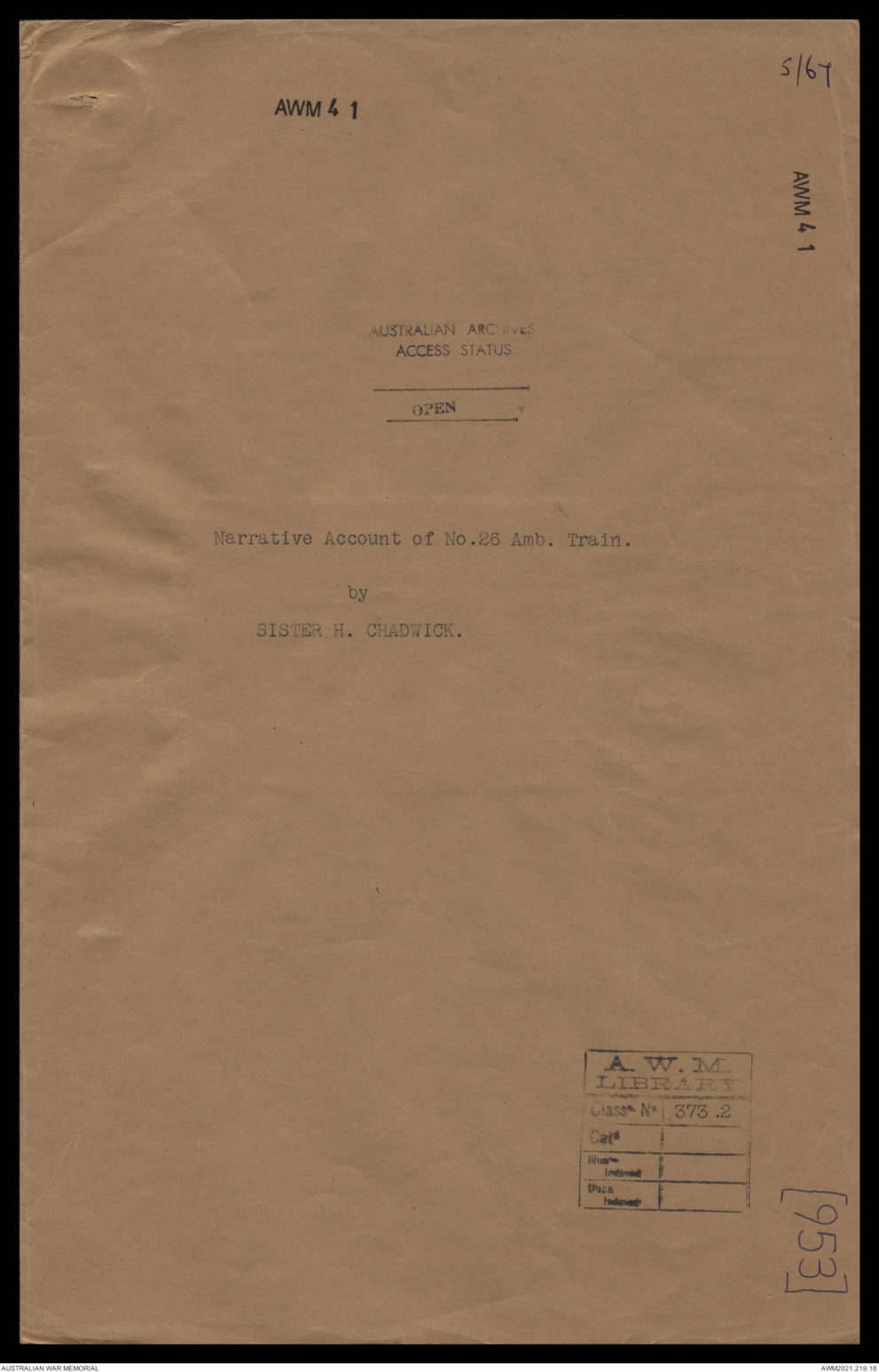
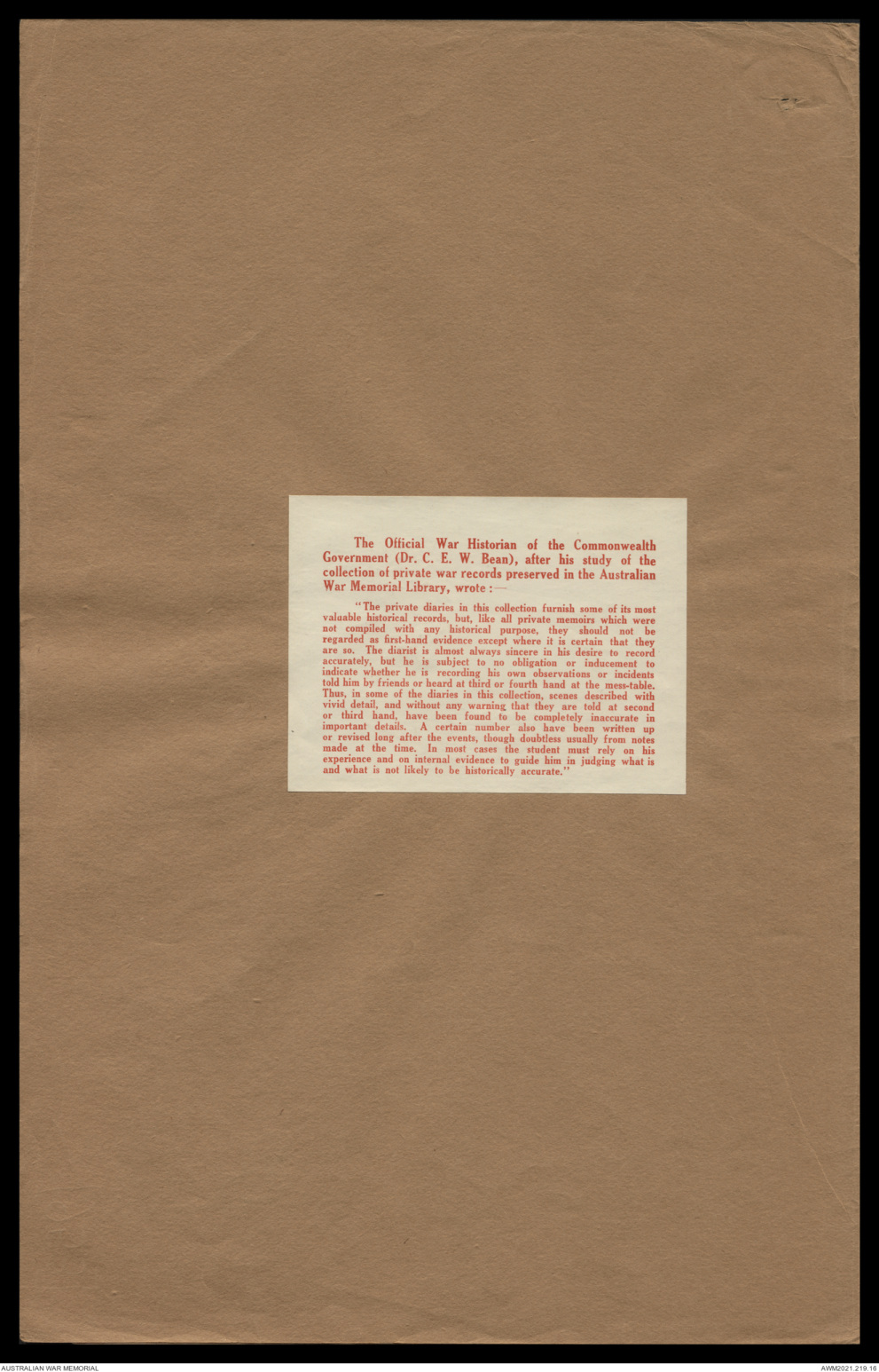
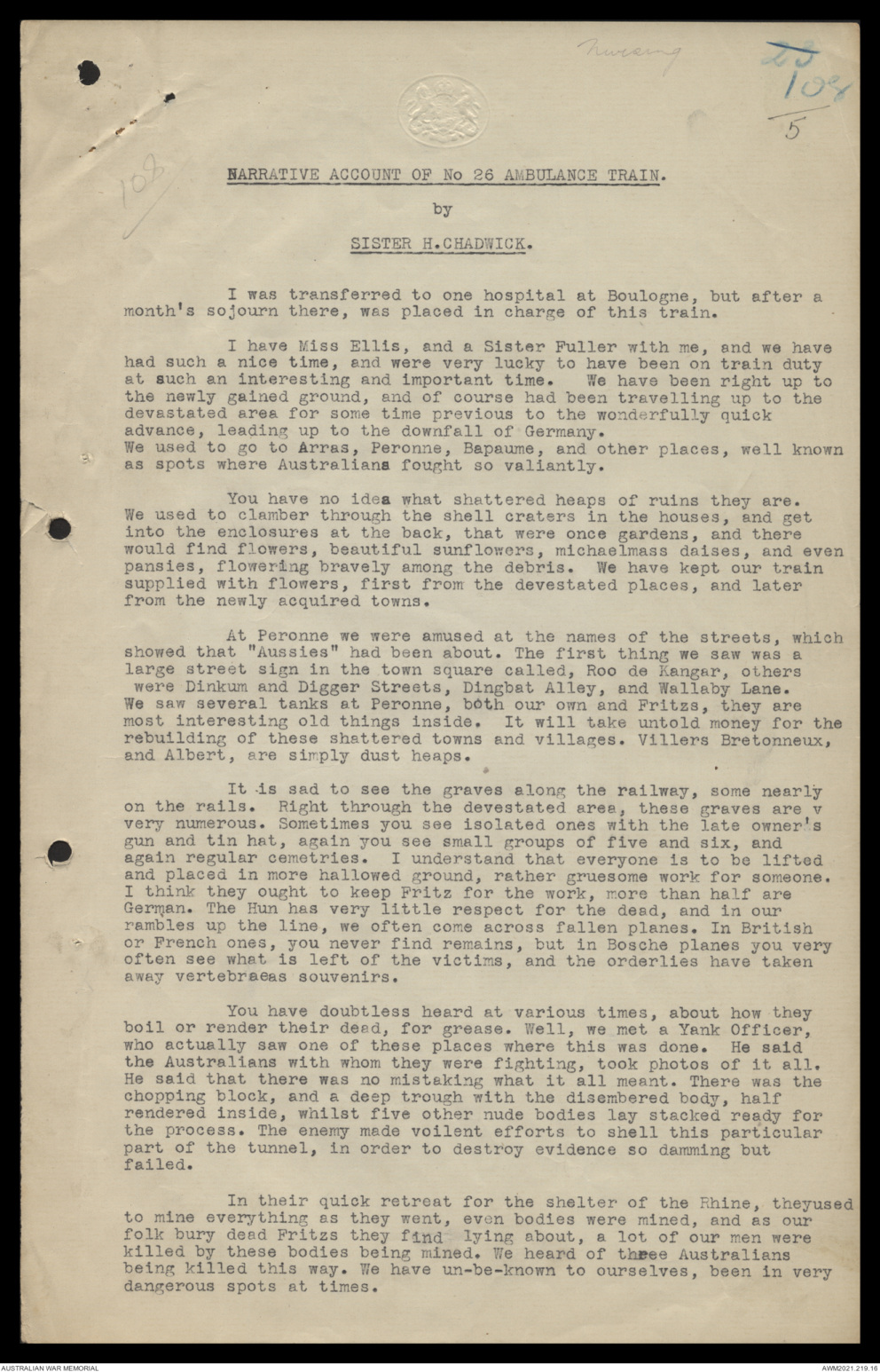
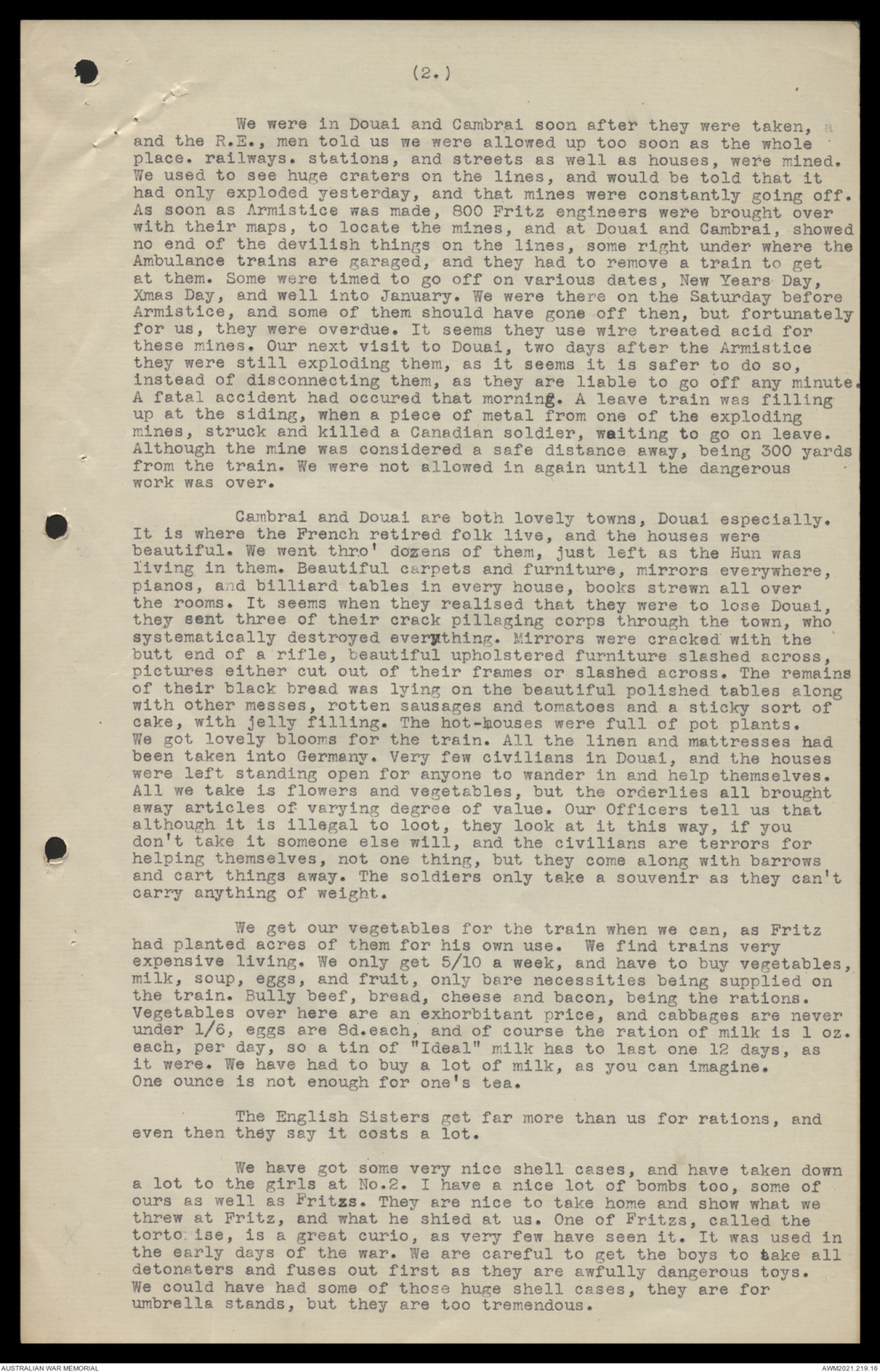
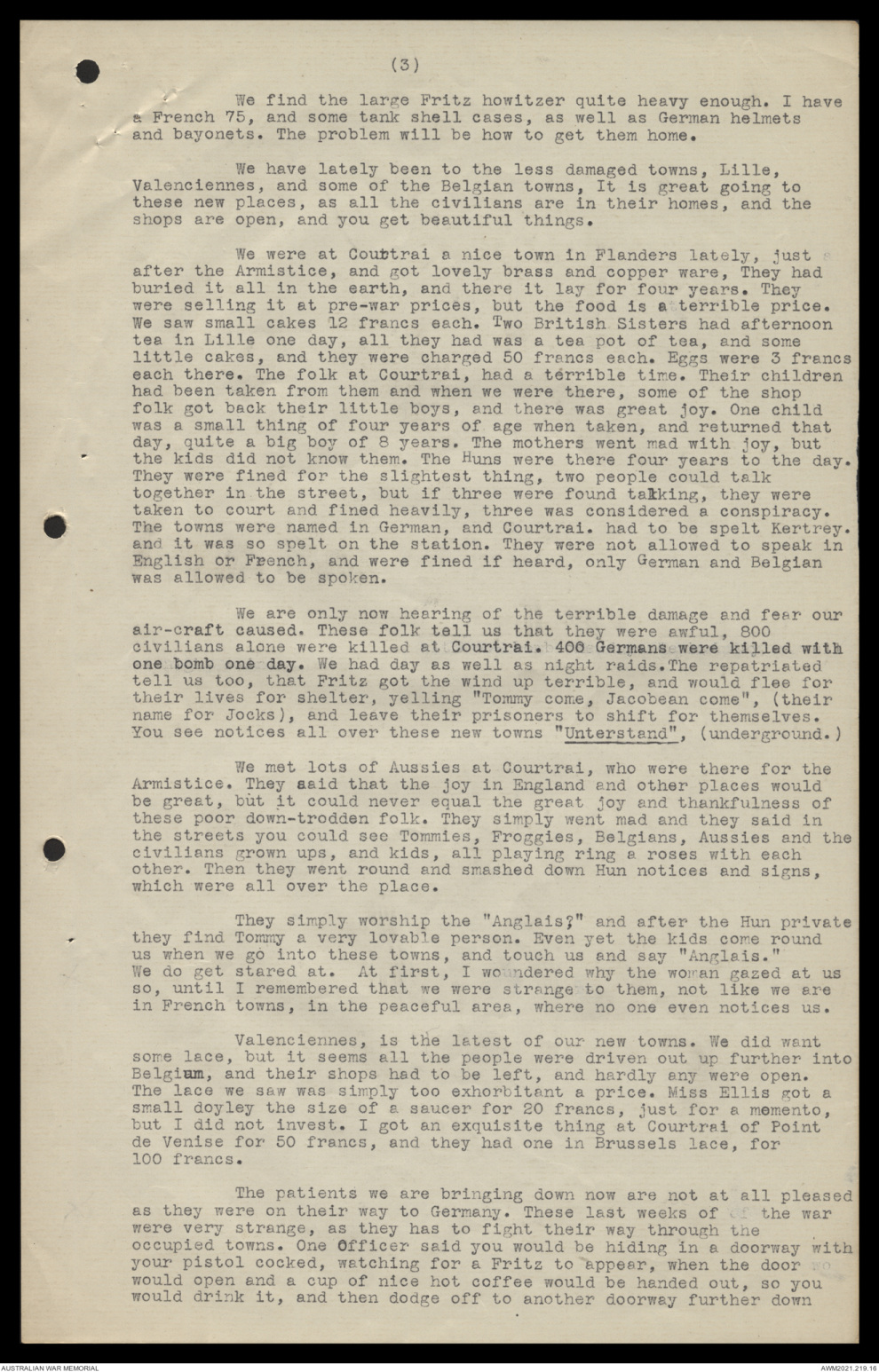
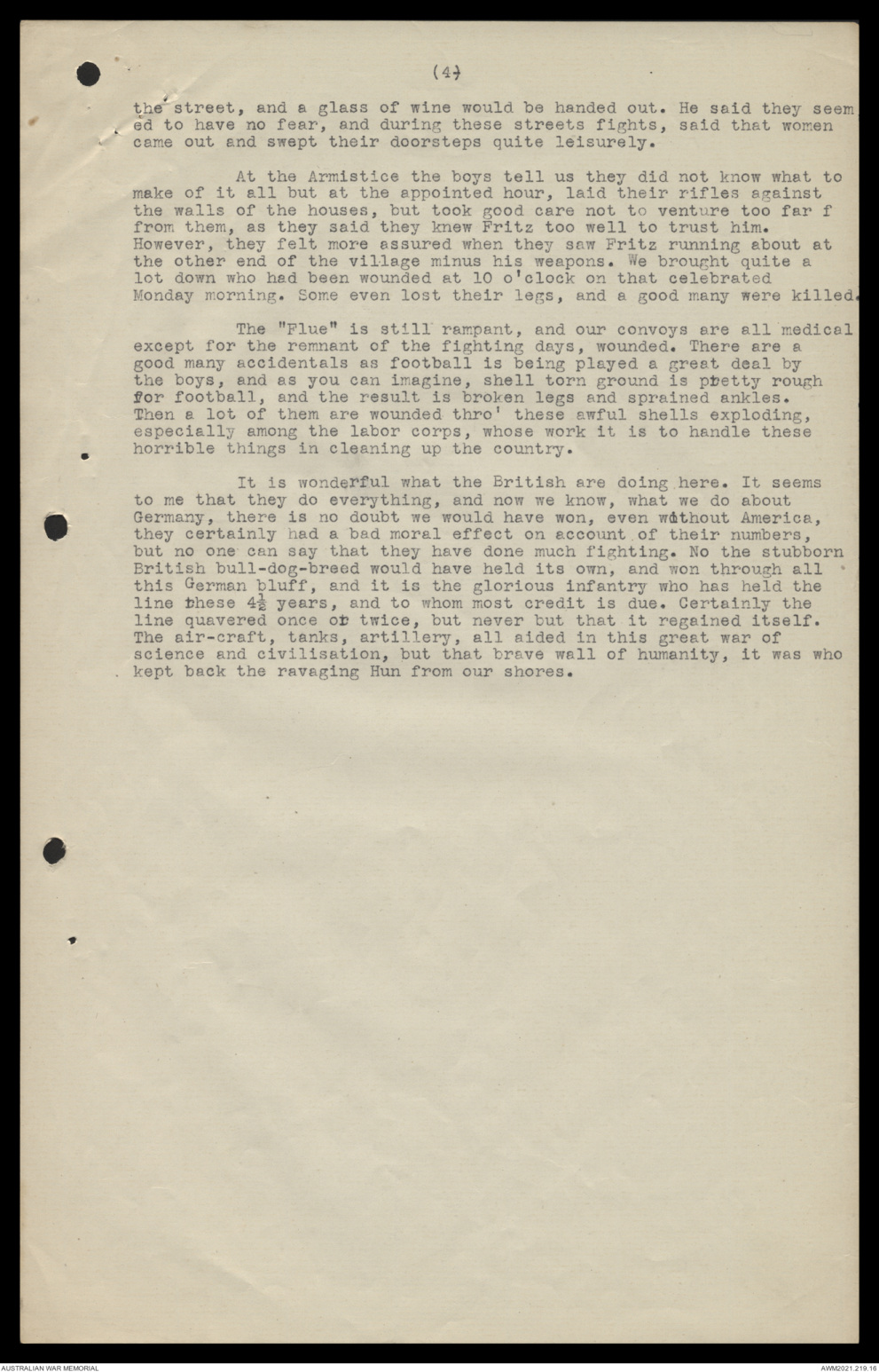
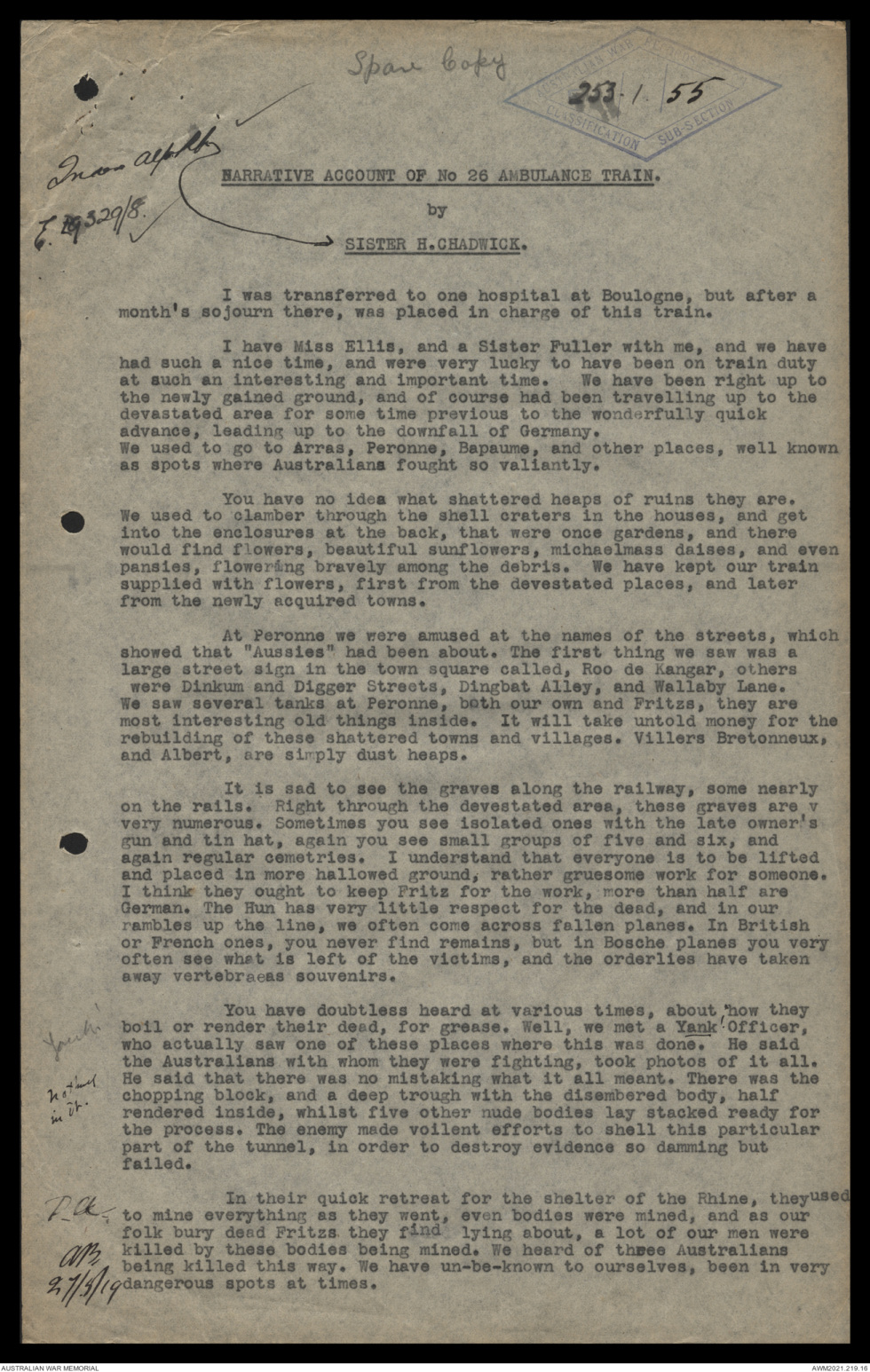
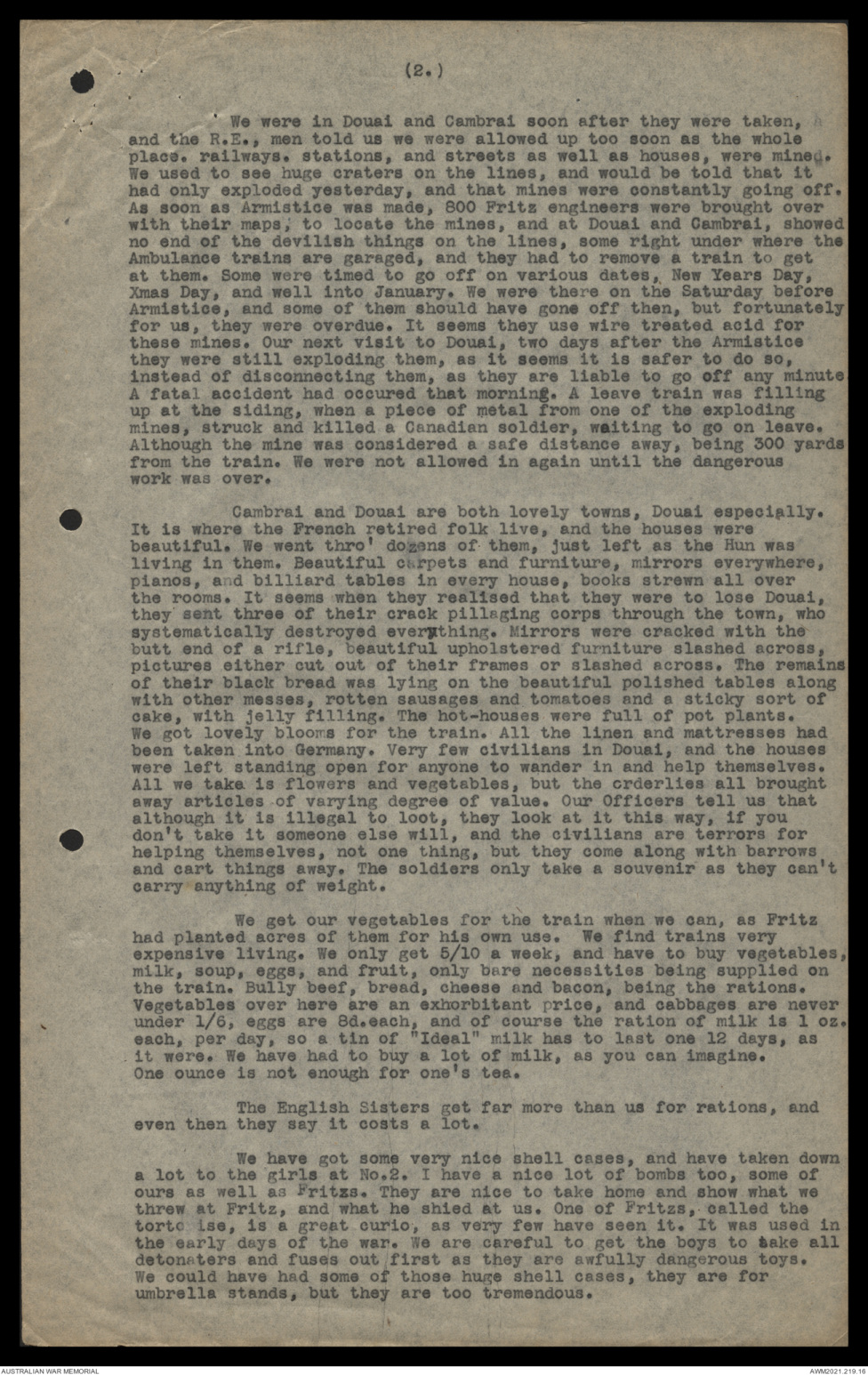
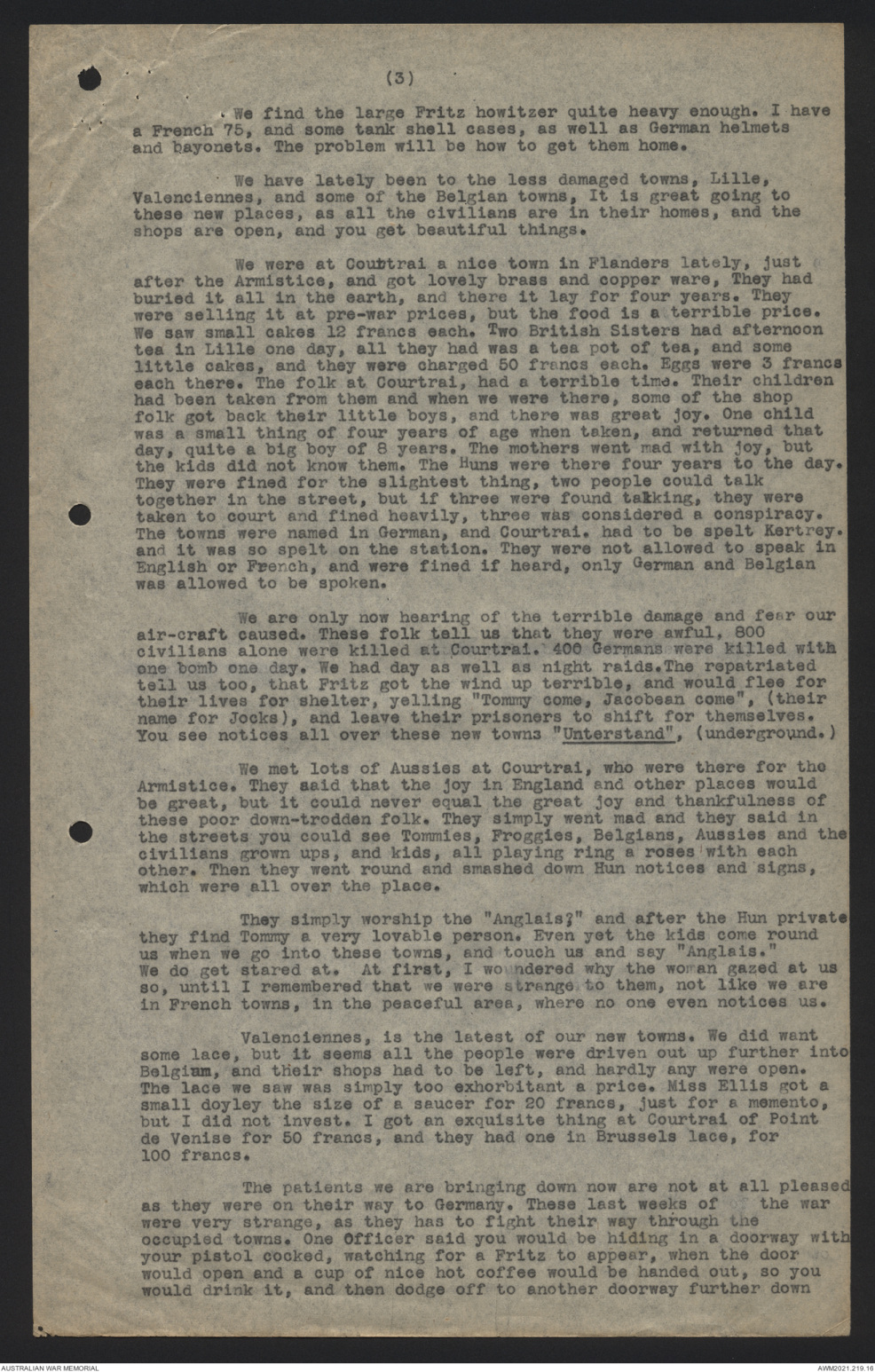
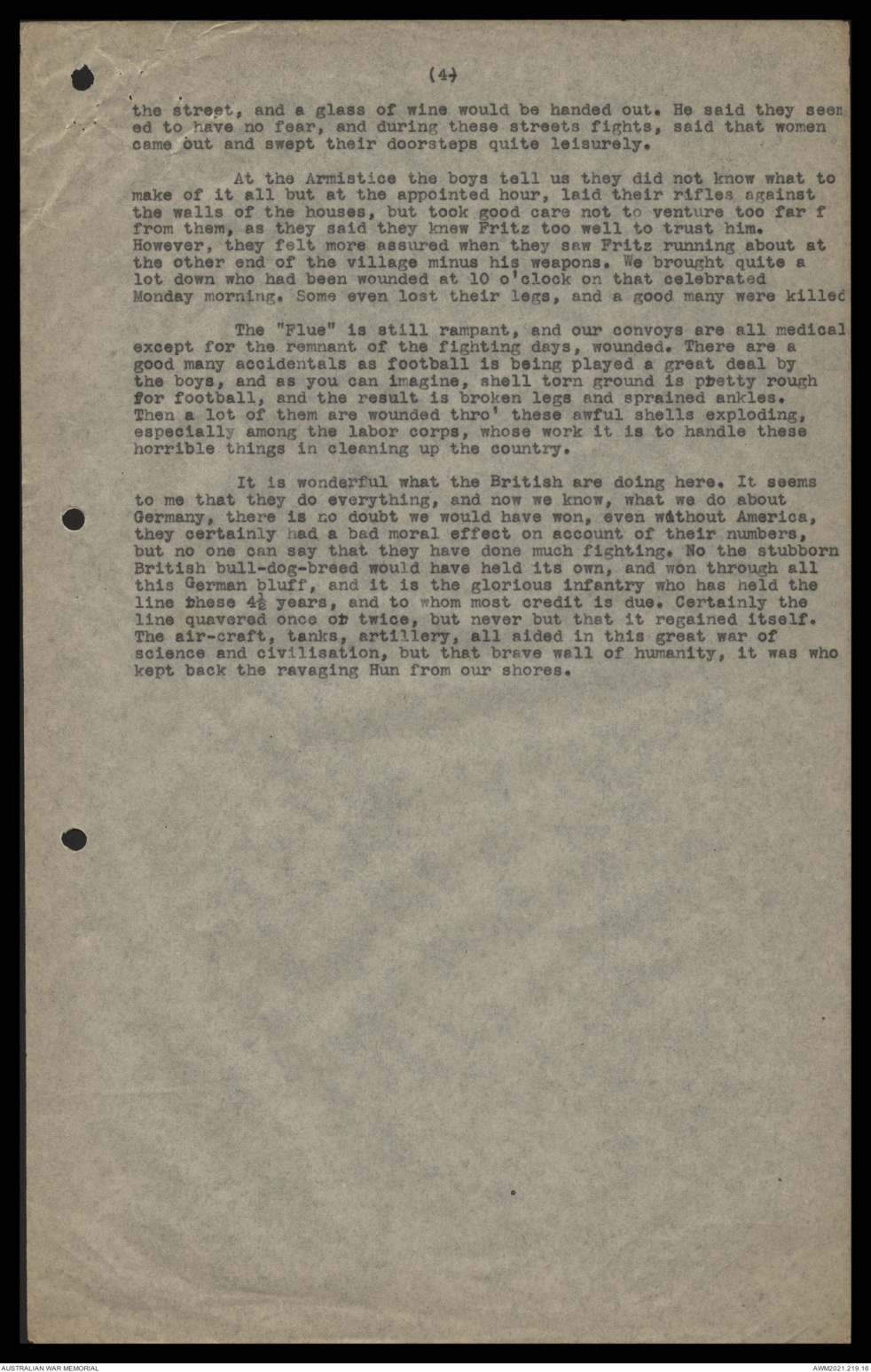
5/67
AWM 4 1
AUSTRALIAN ARCHIVE
ACCESS STATUS
OPEN
Narrative Account of No.26 Amb. Train.
by
SISTER H. CHADWICK.
A.W.M.
LIBRARY
Class No. 373.2
[953]
The Official War Historian of the Commonwealth
Government (Dr. C. E. W. Bean), after his study of the
collection of private war records preserved in the Australian
War Memorial Library, wrote :-
"The private diaries in this collection furnish some of its most
valuable historical records, but, like all private memoirs which were
not compiled with any historical purpose, they should not be
regarded as first-hand evidence except where it is certain that they
are so. The diarist is almost always sincere in his desire to record
accurately, but he is subject to no obligation or inducement to
indicate whether he is recording his own observations or incidents
told him by friends or heard at third or fourth hand at the mess-table.
Thus, in some of the diaries in this collection, scenes described with
vivid detail, and without any warning that they are told at second
or third hand, have been found to be completely inaccurate in
important details.A certain number also have been written up
or revised long after the events, though doubtless usually from notes
made at the time. In most cases the student must rely on his
experience and on internal evidence to guide him in judging what is
and what is not likely to be historically accurate."
Nursing
23 108 5 108
NARRATIVE ACCOUNT OF No 26 AMBULANCE TRAIN.
by
SISTER H. CHADWICK
I was transferred to one hospital at Boulogne, but after a
month's sojourn there, was placed in charge of this train.
I have Miss Ellis, and a Sister Fuller with me, and we have
had such a nice time, and were very lucky to have been on train duty
at such an interesting and important time. We have been right up to
the newly gained ground, and of course had been travelling up to the
devastated area for some time previous to the wonderfully quick
advance, leading up to the downfall of Germany.
We used to go to Arras, Peronne, Bapaume, and other places, well known
as spots where Australians fought so valiantly.
You have no idea what shattered heaps of ruins they are.
We used to clamber through the shell craters in the houses, and get
into the enclosures at the back, that were once gardens, and there
would find flowers, beautiful sunflowers, michaelmass daises, and even
pansies, flowering bravely among the debris. We have kept our train
supplied with flowers, first from the devastated places, and later
from the newly acquired towns.
At Peronne we were amused at the names of the streets, which
showed that "Aussies" had been about. The first thing we saw was a
large street sign in the town square called, Roo de Kangar, others
were Dinkum and Digger Streets, Dingbat Alley, and Wallaby Lane.
We saw several tanks at Peronne, both our own and Fritzs, they are
most interesting old things inside. It will take untold money for the
rebuilding of these shattered towns and villages. Villers Bretonneux,
and Albert, are simply dust heaps.
It is sad to see the graves along the railway, some nearly
on the rails. Right through the devastated area, these graves are v
very numerous. Sometimes you see isolated ones with the late owner's
gun and tin hat, again you see small groups of five and six, and
again regular cemetries. I understand that everyone is to be lifted
and placed in more hallowed ground, rather gruesome work for someone.
I think they ought to keep Fritz for the work, more than half are
German. The Hun has very little respect for the dead, and in our
rambles up the line, we often come across fallen planes. In British
or French ones, you never find remains, but in Bosche planes you very
often see what is left of the victims, and the orderlies have taken
away vertebraeas souvenirs.
You have doubtless heard at various times, about how they
boil or render their dead, for grease. Well, we met a Yank Officer,
who actually saw one of these places where this was done. He said
the Australians with whom they were fighting, took photos of it all.
He said that there was no mistaking what it all meant. There was the
chopping block, and a deep trough with the disembered body, half
rendered inside, whilst five other nude bodies lay stacked ready for
the process. The enemy made voilent efforts to shell this particular
part of the tunnel, in order to destroy evidence so damming but
failed.
In their quick retreat for the shelter of the Rhine, theyused
to mine everything as they went, even bodies were mined, and as our
folk bury dead Fritzs they find lying about, a lot of our men were
killed by these bodies being mined. We heard of three Australians
being killed this way. We have un-be-known to ourselves, been in very
dangerous spots at times.
(2.)
We were in Douai and Cambrai soon after they were taken,
and the R.E., men told us we were allowed up too soon as the whole
place. railways. stations, and streets as well as houses, were mined.
We used to see huge craters on the lines, and would be told that it
had only exploded yesterday, and that mines were constantly going off.
As soon as Armistice was made, 800 Fritz engineers were brought over
with their maps, to locate the mines, and at Douai and Cambrai, showed
no end of the devilish things on the lines,some right under where the
Ambulance trains are garaged, and they had to remove a train to get
at them. Some were timed to go off on various dates, New Years Day,
Xmas Day, and well into January. We were there on the Saturday before
Armistice, and some of them should have gone off then, but fortunately
for us, they were overdue.It seems they use wire treated acid for
these mines. Our next visit to Douai, two days after the Armistice
they were still exploding them, as it seems it is safer to do so,
instead of disconnecting them, as they are liable to go off any minute.
A fatal accident had occured that morning.A leave train was filling
at the siding, when a piece of metal from one of the exploding
mines, struck and killed a Canadian soldier, waiting to go on leave.
Although the mine was considered a safe distance away, being 300 yards
from the train. We were not allowed in again until the dangerous
work was over.
Cambrai and Douai are both lovely towns, Douai especially.
It is where the French retired folk live, and the houses were
beautiful. We went thro' dozens of them, just left as the Hun was
living in them. Beautiful carpets and furniture, mirrors everywhere,
pianos, and billiard tables in every house, books strewn all over
the rooms. It seems when they realised that they were to lose Douai,
they sent three of their crack pillaging corps through the town, who
systematically destroyed everything. Mirrors were cracked with the
butt end of a rifle, beautiful upholstered furniture slashed across,
pictures either cut out of their frames or slashed across. The remains
of their black bread was lying on the beautiful polished tables along
with other messes, rotten sausages and tomatoes and sticky sort of
cake, with jelly filling. The hot-houses were full of pot plants.
We got lovely blooms for the train. All the linen and mattresses had
been taken into Germany. Very few civilians in Douai, and the houses
were left standing open for anyone to wander in and help themselves.
All we take is flowers and vegetables, but the orderlies all brought
away articles of varying degree of value. Our Officers tell us that
although it is illegal to loot, they look at it this way, if you
don't take it someone else will, and the civilians are terrors for
helping themselves, not one thing, but they come along with barrows
and cart things away. The soldiers only take a souvenir as they can't
carry anything of weight.
We get our vegetables for the train when we can, as Fritz
had planted acres of them for his own use. We find trains very
expensive living. We only get 5/10 a week, and have to buy vegetables,
milk, soup, eggs, and fruit, only bare necessities being supplied on
the train. Bully beef, bread, cheese and bacon, being the rations.
Vegetables over here are an exhorbitant price, and cabbages are never
under 1/6, eggs are 8d. each, and of course the ration. of milk is 1 oz.
each, per day, so a tin of "Ideal" milk has to last one 12 days, as
it were. We have had to buy a lot of milk, as you can imagine.
One ounce is not enough for one's tea.
The English Sisters get far more than us for rations, and
even then they say it costs a lot.
We have got some very nice shell cases, and have taken down
a lot to the girls at No. 2. I have a nice lot of bombs too, some of
ours as well as Fritzs. They are nice to take home and show what we
threw at Frtiz, and what he shied at us. One of Fritzs, called the
torto ise, is a great curio, as very few have seen it. It was used in
the early days of the war. We are careful to get the boys to take all
detonaters and fuses out first as they are awfully dangerous toys.
We could have had some of those huge shell cases, they are for
umbrella stands, but they are too tremendous.
(3)
We find the large Fritz howitzer quite heavy enough. I have
a French 75, and some tank shell cases, as well as German helmets
and bayonets. The problem will be how to get them home.
We have lately been to the less damaged towns, Lille,
Valenciennes, and some of the Belgian towns, It is great going to
these new places, as all the civilians are in their homes, and the
shops are open, and you get beautiful things.
We were in Courtrai a nice town in Flanders lately, just
after the Armistice, and got lovely brass and copper ware, They had
buried it all in the earth, and there it lay for four years. They
were selling it at pre-war prices, but the food is a terrible price.
We saw small cakes 12 francs each. Two British Sisters had afternoon
tea in Lille one day, all they had was a tea pot of tea, and some
little cakes,and they were charged 50 francs each. Eggs were 3 francs
each there. The folk at Courtrai, had a terrible time. Their children
had been taken from them and when we were there, some of the shop
folk got back their little boys, and there was great joy. One child
was a small thing of four years of age when taken, and returned that
day, quite a big boy of 8 years.The mothers went mad with joy, but
the kids did not know them. The Huns were there four years to the day.
They were fined for the slightest thing, two people could talk
together in the street, but if three were found talking, they were
taken to court and fined heavily, three was considered a conspiracy.
The towns were named in German, and Courtrai. had to be spelt Kertrey
and it was so spelt on the station. They were not allowed to speak in
English or French, and were fined if heard, only German and Belgian
was allowed to be spoken.
We are only now hearing of the terrible damage and fear our
air-craft caused. These folk tell us that they were awful, 800
civilians alone were killed at Courtrai. 400 Germans were killed with
one bomb one day. We had day as well as night raids. The repatriated
tell us too, that Fritz got the wind up terrible, and would flee for
their lives for shelter, yelling "Tommy come, Jacobean come", (their
name for Jocks), and leave their prisoners to shift for themselves.
You see notices all over these new towns "Unterstand", (underground.)
We met lots of Aussies at Courtrai, who were there for the
Armistice. They said that the joy in England and other places would
be great, but it could never equal the great joy and thankfulness of
these poor down-trodden folk.They simply went mad and they said in
the streets you could see Tommies, Froggies, Belgians, Aussies and the
civilians grown ups, and kids, all playing ring a roses with each
other. Then they went round and smashed down Hun notices and signs,
which were all over the place.
They simply worship the "Anglais?" and after the Hun private
they find Tommy a very loveable person. Even yet the kids come round
us when we go into these towns, and touch us and say "Anglais."
We do get stared at. At first, I woundered why the woman gazed at us
so, until I remembered that we were strange to them, not like we are
in French towns, in the peaceful area, where no one even notices us.
Valenciennes, is the latest of our new towns. We did want
some lace, but it seems all the people were driven out up further into
Belgium, and their shops had to be left, and hardly any were open.
The lace we saw was simply too exhorbitant a price. Miss Ellis got a
small doyley the size of a saucer for 20 francs, just for a momento,
but I did not invest. I got an exquisite thing at Courtrai of Point
de Venise for 50 francs, and they had one in Brussels lace, for
100 francs.
The patients we are bringing down now are not at all pleased
as they were on their way to Germany. These last weeks of the war
were very strange, as they has to fight their way through the
occupied towns. One officer said you would be hiding in a doorway with
your pistol cocked, watching for a Fritz to appear, when the door
would open and a cup of nice hot coffee would be handed out, so you
would drink it, and then dodge off to another doorway further down
(4.)
the street, and a glass of wine would be handed out. He said they seem
ed to have no fear, and during these streets fights, said that women
came out and swept their doorsteps quite leisurely.
At the Armistice the boys tell us they did not know what to
make of it all but at the appointed hour, laid their rifles against
the walls of the houses, but took good care not to venture too far f
from them, as they said they knew Fritz too well to trust him.
However, they felt more assured when they saw Fritz running about at
the other end of the village minus his weapons. We brought quite a
lot down who had been wounded at 10 o'clock on that celebrated
Monday morning. Some even lost their legs, and a good many killed
The "Flue" is still rampant, and our convoys are all medical
except for the remnant of the fighting days, wounded. There are a
good many accidentals as football is being played a great deal by
the boys, and as you can imagine, shell torn ground is pretty rough
for football, and the result is broken legs and sprained ankles.
Then a lot of them are wounded thro' these awful shells exploding,
especially among the labor corps, whose work it is to handle these
horrible things in cleaning up the country.
It is wonderful what the British are doing here. It seems
to me that they do everything, and now we know, what we do about
Germany, there is no doubt we would have won, even without America,
they certainly had a bad moral effect on account of their numbers,
but no one can say that they have done much fighting. No the stubborn
British bull-dog-breed would have held its own, and won through all
this German bluff, and it is the glorious infantry who has held the
line these 4 ½ years, and to whom most credit is due. Certainly the
line quavered once or twice, but never but that it regained itself.
The air-craft, tanks, artillery, all aided in this great war of
science and civilisation, but that brave wall of humanity, it was who
kept back the ravaging Hun from our shores.
Spare Copy
NARRATIVE ACCOUNT OF No 26 AMBULANCE TRAIN.
by
SISTER H. CHADWICK.
I was transferred to one hospital at Boulogne, but after a
month's sojourn there, was placed in charge of this train.
I have Miss Ellis, and a Sister Fuller with me, and we have
had such a nice time, and were very lucky to have on train duty
at such an interesting and important time. We have been right up to
the newly gained ground, and of course had been travelling up to the
devastated area for some time previous to the wonderfully quick
advance, leading up to the downfall of Germany.
We used to go to Arras, Peronne, Bapaume, and other places, well known
as spots where Australians fought so valiantly.
You have no idea what shattered heaps of ruins they are.
We used to clamber through the shell craters in the houses, and get
into the enclosure at the back, that were once gardens, and there
would find flowers, beautiful sunflowers, michaelmass daises, and even
pansies, flowering braverly among the debris. We have kept our train
supplied with flowers, first from the devastated places, and later
from the newly acquired towns.
At Peronne we were amused at the names of the streets, which
showed that "Aussies" had been about. The first thing we saw was a
large street sign in the town square called, Roo de Kangar, others
were Dinkum and Digger Streets, Dingbat Alley, and Wallaby Lane.
We saw several tanks at Peronne, both our own and Frtizs, they are
most interesting old things inside. It will take untold money for the
rebuilding of these shattered towns and villages. Villers Bretonneux,
and Albert, are simply dust heaps.
It is sad to see the graves along the railway, some nearly
on the rails. Right through the devastated area, these graves are v
very numerous. Sometimes you see isolated ones with the late owner's
gun and tin hat, again you see small groups of five and six, and
again regular cemeteries. I understand that everyone is to be lifted
and placed in more hallowed ground, rather gruesome work for someone.
I think they ought to keep Frtiz for the work, more than half are
German. The Hun has very little respect for the dead, and in our
rambles up the line, we often come across fallen planes. The British
or French ones, you never find remains, but in Bosche planes you very
often see what is left of the victims, and the orderlies have taken
away vertebraeas souvenirs.
Your have doubtless heard at various times, about how they
boil or render their dead, for grease. Well, we met a Yank Officer,
who actually saw one of these places where this was done. He said
the Australians with whom they were fighting, took photos of it all.
He said that there was no mistaking what it all meant. There was the
chopping block, and a deep trough with the disembered body, half
rendered inside, whilst five other nude bodies lay stacked ready for
the process. The enemy made violent efforts to shell this particular
part of the tunnel, in order to destroy evidence so damming but
failed.
In their quick retreat for the shelter of the Rhine, theyused
to mine everything as they went, even bodies were mined, and as our
folk bury dead Fritzs they find lying about, a lot of our men were
killed by these bodies being mined. We heard of three Australians
being killed this way. We have un-be-known to ourselves, been in very
dangerous spots at times.
(2.)
We were in Douai and Cambrai soon after they were taken,
and the R.E., men told us we were allowed up too soon as the whole
place. railways. stations, and streets as well as houses, were mined.
We used to see huge craters on the lines, and would be told that it
had only exploded yesterday, and that mines were constantly going off.
As soon as Armistice was made, 800 Fritz engineers were brought over
with their maps, to locate the mines, and at Douai and Cambrai, showed
no end of the devilish things on the lines,some right under where the
Ambulance trains were garaged, and they had to remove a train to get
at them. Some were timed to go off on various dates, New Years Day,
Xmas Day, and well into January. We were there on the Saturday before
Armistice, and some of them should have gone off then, but fortunately
for us, they were overdue.It seems they use wire treated acid for
these mines. Our next visit to Douai, two days after Armistice
they were still exploding them, as it seems it is safer to do so,
instead of disconnecting them, as they are liable to go off any minute.
A fatal accident had occured that morning.A leave train was filling
at the siding, when a piece of metal from one of the exploding
mines, struck and killed a Canadian soldier, waiting to go on leave.
Although the mine was considered a safe distance away, being 300 yards
from the train. We were not allowed in again until the dangerous
work was over.
Cambrai and Douai are both lovely town, Douai especially.
It is where the French retired folk live, and the houses were
beautiful. We went thro' dozens of them, just left as the Hun was
living in them. Beautiful carpets and furniture, mirrors everywhere,
pianos, and billiard tables in every house, books strewn all over
the rooms. It seems when they realised that they were to lose Douai,
they sent three of their crack pillaging corps through the town, who
systematically destroyed everything. Mirrors were cracked with the
butt end of a rifle, beautiful upholstered furniture slashed across,
pictures either cut out of their frames or slashed across. The remains
of their black bread was lying on the beautiful polished tables along
with other messes, rotten sausages and tomatoes and sticky sort of
cake, with jelly filling. The hot-houses were full of pot plants.
We got lovely blooms for the train. All the linen and mattresses had
been taken into Germany. Very few civilians in Douai, and the houses
were left standing open for anyone to wander in and help themselves.
All we take is flowers and vegetables, but the orderlies all brought
away articles of varying degree of value. Our Officers tell us that
although it is illegal to loot, they look at it this way, if you
don't take it someone else will, and the civilians are terrors for
helping themselves, not one thing, but they come along with barrows
and cart things away. The soldiers only take a souvenir as they can't
carry anything of weight.
We get our vegetables for the train when we can, as Fritz
had planted acres of them for his own use. We find trains very
expensive living. We only get 5/10 a week, and have to buy vegetables,
milk, soup, eggs, and fruit, only bare necessities being supplied on
the train. Bully beef, bread, cheese and bacon, being the rations.
Vegetables over here are an exhorbitant price, and cabbages are never
under 1/6, eggs are 8d. each, and of course the ration. of milk is 1 oz.
each, per day, so a tin of "Ideal" milk has to last one 12 days, as
it were. We have had to buy a lot of milk, as you can imagine.
One ounce is not enough for one's tea.
The English Sisters get far more than us for rations, and
even then they say it costs a lot.
We have got some very nice shell cases, and have taken down
a lot to the girls at No. 2. I have a nice lot of bombs too, some of
ours as well as Fritzs. They are nice to take home and show what we
threw at Frtiz, and what he shied at us. One of Fritzs, called the
tortoise, is a great curio, as very few have seen it. It was used in
the early days of the war. We are careful to get the boys to take all
detonates and fuses out first as they are awfully dangerous toys.
We could have had some of those huge shell cases, they are for
umbrella stands, but they are too tremendous.
(3)
We find the large Fritz howitzer quite heavy enough. I have
a French 75, and some tank shell cases, as well as German helmets
and bayonets. The problem will be how to get them home.
We have lately been to the less damaged towns, Lille,
Valenciennes, and some of the Belgian towns, It is great going to
these new places, as all the civilians are in their homes, and the
shops are open, and you get beautiful things.
We were in Courtrai a nice town in Fladers lately, just
after the Armistice, and got lovely brass and copper ware, They had
buried it all in the earth, and there it lay for four years. They
were selling it at pre-war prices, but the food is a terrible price.
We saw small cakes 12 francs each. Two British Sisters had afternoon
tea in Lillie one day, all they had was a tea pot of tea, and some
little cakes,and they were charged 50 francs each. Eggs were 3 francs
each there. The folk at Courtrai, had a terrible time. Their children
had been taken from them and when we were there, some of the shop
folk got back their little boys, and there was great joy. One child
was a small thing of four years of age when taken, and returned that
day, quite a big boy of 8 years.The mothers went mad with joy, but
the kids did not know them. The Huns were there four years to the day.
They were fined for the slightest thing, two people could talk
together in the street, but if three were found talking, they were
taken to court and fined heavily, three was considered a conspiracy.
The towns were named in German, and Courtrai. had to be spelt Kertry
and it was so spelt on the station. They were not allowed to speak in
English or French, and were fined if heard, only German and Belgian
was allowed to be spoken.
We are now hearing of terrible damage and fear our
air-craft caused. These folk tell us that they were awful, 800
civilians alone were killed at Courtrai. 400 Germans were killed with
one bomb one day. We had day as well as night raids. The repatriated
tell us too, that Fritz got the wind up terrible, and would flee for
their lives for shelter, yelling "Tommy come, Jacobean come", (their
name for Jocks), and leave their prisoners to shift for themselves.
You see notices all over these new towns "Unterstand", (underground.)
We met lots of Aussies at Courtrai, who were there for the
Armistice. They said that they joy in England and other places would
be great, but it could never equal the great joy and thankfulness of
these poor down-trodden folk.They simply went mad and they said in
the streets you could see Tommies, Froggies, Belgians, Aussies and the
civilian grown ups, and kids, all playing ring a roses with each
other. Then they went round and smashed down Hun notices and signs,
which were all over the place.
They simply worship the "Anglais?" and after the Hun private
they find Tommy a very loveable person. Even yet the kids come round
us when we go into these towns, and touch us and say "Anglais."
We do get stared at. At first, I wondered why the woman gazed at us
so, until I remembered that we were strange to them, not like we are
in French towns, in the peaceful areas, where no one even notices us.
Valenciennes, is the latest of our new towns. We did want
some lace, but it seems all the people were driven out further into
Belgium, and their shops had to be left, and hardly any were open.
The lace we saw was simply too exhorbitant a price. Miss Ellis got a
small doyley the size of a saucer for 20 francs, just for a momento,
but I did not invest. I got an exquisite thing at "Courtrai of Point
de Venise for 50 francs, and they had one in Brussels lace, for
100 francs.
The patients we are bringing down now are not at all pleased
as they were on their way to Germany. These last weeks of the war
were very strange, as they has to fight their way through the
occupied towns. One officer said you would be hiding in a doorway with
your pistol cocked, watching for a Fritz to appear, when the door
would open and a cup of nice hot coffee would be handed out, so you
would drink it, and then dodge off to another doorway further down
(4.)
the street, and a glass of wine would be handed out. He said they seem
ed to have no fear, and during these streets fights, said that women
came out and swept their doorsteps quite leisurely.
At the Armistice the boys tell us they did not know what to
make of it all but at the appointed hour, laid their rifles against
the walls of the houses, but took good care not to venture too far
from them, as they said they knew Fritz too well to trust him.
However, they felt more assured when they saw Fritz running about at
the other end of the village minus his weapons. We brought quite a
lot down who had been wounded at 10 o'clock on that celebrated
Monday morning. Some even lost their legs, and a good many killed
The "Flue" is still rampant, and our convoys are all medical
except for the remnant of the fighting days, wounded. There are a
good many accidentals as football is being played a great deal by
the boys, and as you can imagine, shell torn ground is pretty rough
for football, and the result is broken legs and sprained ankles.
Then a lot of them are wounded thro' these awful shells exploding,
especially among the labor corps, whose work it is to handle these
horrible things in cleaning up the country.
It is wonderful what the British are doing here. It seems
to me that they do everything, and now we know, what we do about
Germany, there is no doubt we would have won, even without America,
they certainly had a bad moral effect on account of their numbers,
but no one can say that they have done much fighting. No the stubborn
British bull-dog-breed would have held its own, and won through all
this German bluff, and it is the glorious infantry who has held the
line these 4 ½ years, and to whom most credit is due. Certainly the
line quavered once or twice, but never that it regained itself.
The air-craft, tanks, artillery, all aided in this great war of
science and civilisation, but that brave wall of humanity, it was who
kept back the ravaging Hun from our shores.
 Jacqueline Kennedy
Jacqueline KennedyThis transcription item is now locked to you for editing. To release the lock either Save your changes or Cancel.
This lock will be automatically released after 60 minutes of inactivity.